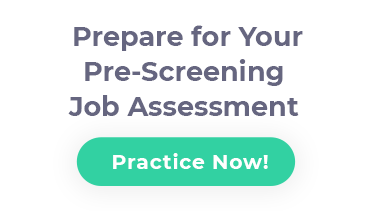Cognitive Aptitude Test Online Preparation [2025]

What Are Cognitive Aptitude Tests?
Cognitive aptitude tests are common pre-employment assessments that employers give to measure a candidate’s cognitive ability. This test aims to assess your thinking, which could include your reasoning skills, problem-solving, or mathematical ability.
Each employer will tailor their specific cognitive aptitude test to their needs to better reflect the position. However, most exams will be timed and multiple-choice and cover similar topics. Since each test is different, the exact makeup and content of the exam will vary by employer. However, most cognitive aptitude tests will combine the following question types.
Logical Reasoning
Logical reasoning exams will assess your ability to interpret information and draw conclusions. There are five types of logical reasoning tests that you may encounter on your cognitive ability exam:
- Diagrammatic Reasoning: These questions are non-verbal and will visually represent a problem that you must use logical connections to solve. For example, you may see specific inputs and outputs on a diagram and need to determine what process would achieve the result.
- Inductive Reasoning: These questions will ask you to determine a conclusion based on a given information set. For example, you may receive a series of shapes and need to identify which shape would come next in the series.
- Deductive Reasoning: During these questions, you will receive a list of premises and need to draw the correct conclusion. For example, you may receive a list of stated facts and must determine if a concluding statement is true or false based on the information.
- Critical Reasoning: Critical reasoning questions will present a scenario followed by a supporting statement, and you must decide whether the argument is sound.
- Abstract Reasoning: Similar to diagrammatic reasoning tests, abstract reasoning tests will require you to find relationships or patterns underlying a group or series of images and determine the missing image.
Spatial Reasoning
Spatial reasoning tests will examine your ability to visualize the movement of objects. There are a few different types of questions that you may encounter on this exam:
- Group Rotation: These questions will require you to mentally rotate a shape to visualize it from a different perspective.
- Shape Matching:In these questions, you will examine different groups of shapes and determine which ones are the same. The shapes may be oriented differently, so you’ll have to imagine rotating the shapes to find their matches.
- Cube Views: You will receive multiple views of a cube with different symbols on each side and must answer questions about the different faces.
- Combining 2D Shapes: You will receive pieces of a 2D shape that have been cut up and will need to determine what shape they can combine to make.
- Mirror Image: You will identify the mirror image of 2D or 3D shapes.
- Block Counting: You will see an image of a pile of blocks where some blocks will be hidden from your view, and you will have to reason how many blocks are in the image.
- Maps: You will receive instructions to navigate a 2D map or floor plan.
Numerical Reasoning
Cognitive aptitude tests will also include numerical reasoning questions. The difficulty of these questions will depend on the role that you are applying for, but you should prepare to answer questions that include the following:
- Basic operations (addition, subtraction, multiplication, division)
- Percentages, decimals, fractions
- Word problems
- Basic algebra
- Basic geometry
- Charts, tables, graphs
Verbal Reasoning
You should also prepare to answer verbal reasoning questions. For these questions, you will receive a text passage and answer questions related to grammar, word usage, or text analysis to draw conclusions. For example, a statement will be given after the passage, and you must use the information to determine if that statement could be true.
Examples of Cognitive Aptitude Tests
Here are a few examples of common cognitive aptitude tests that employers utilize during their recruitment process:
Criteria Cognitive Aptitude Test (CCAT)
One of the most common cognitive assessments is the CCAT. This exam consists of 50 multiple-choice questions that assess your ability to solve problems, think critically, and learn and apply new information. You will only have 15 minutes to answer these questions, so you must work through this test quickly and accurately.
Predictive Index (PI) Cognitive Assessment
The PI Cognitive Assessment is a quick exam that gives your employer more information about how you adapt to new situations, learn, and make decisions. You will only have 12 minutes to answer 50 questions on numerical, verbal, and abstract reasoning topics.
Wonderlic Cognitive Ability Exam
The Wonderlic exam aims to assess the test taker’s general mental ability. Your responses will show the employer how well you learn from experiences, comprehend complex ideas, think abstractly, and problem-solve. You will have 12 minutes to answer 50 questions on math, spatial reasoning, logic, pattern identification, and language comprehension.
Matrigma
The Matrigma exam is another assessment of general mental ability. The exam will present non-verbal questions presented as 3×3 matrices to test your abstract reasoning. Some test versions will get progressively more challenging as you answer questions correctly.
Hogan Business Reasoning Inventory (HBRI)
The HBRI exam will assess your ability to analyze complex data, make effective decisions, and devise effective conclusions. The exam is 30 minutes long and consists of 24 questions covering numerical reasoning, abstract reasoning, logical reasoning, and verbal reasoning.
How to Prepare for Cognitive Aptitude Test?
Online practice tests are the best way to prepare for cognitive aptitude tests. Because most cognitive exams are visual, some of the questions presented are easier to understand if you can look at examples and work through them yourself. Full-length practice tests will allow you to work through these sample problems and will give solutions and tips that you can use on future exams.
The other great thing about taking practice tests is that it allows you to practice your timing. Because the cognitive exams are timed, learning how to pace yourself would be best. You’ll need to be familiar enough with the questions to answer them quickly and confidently.
Applicants who prepare for the cognitive tests beforehand receive significantly higher scores than those who did not study for the exam. Because your score will be compared to the other applicants, you want to do everything possible to ensure you are adequately prepared for the exam.

